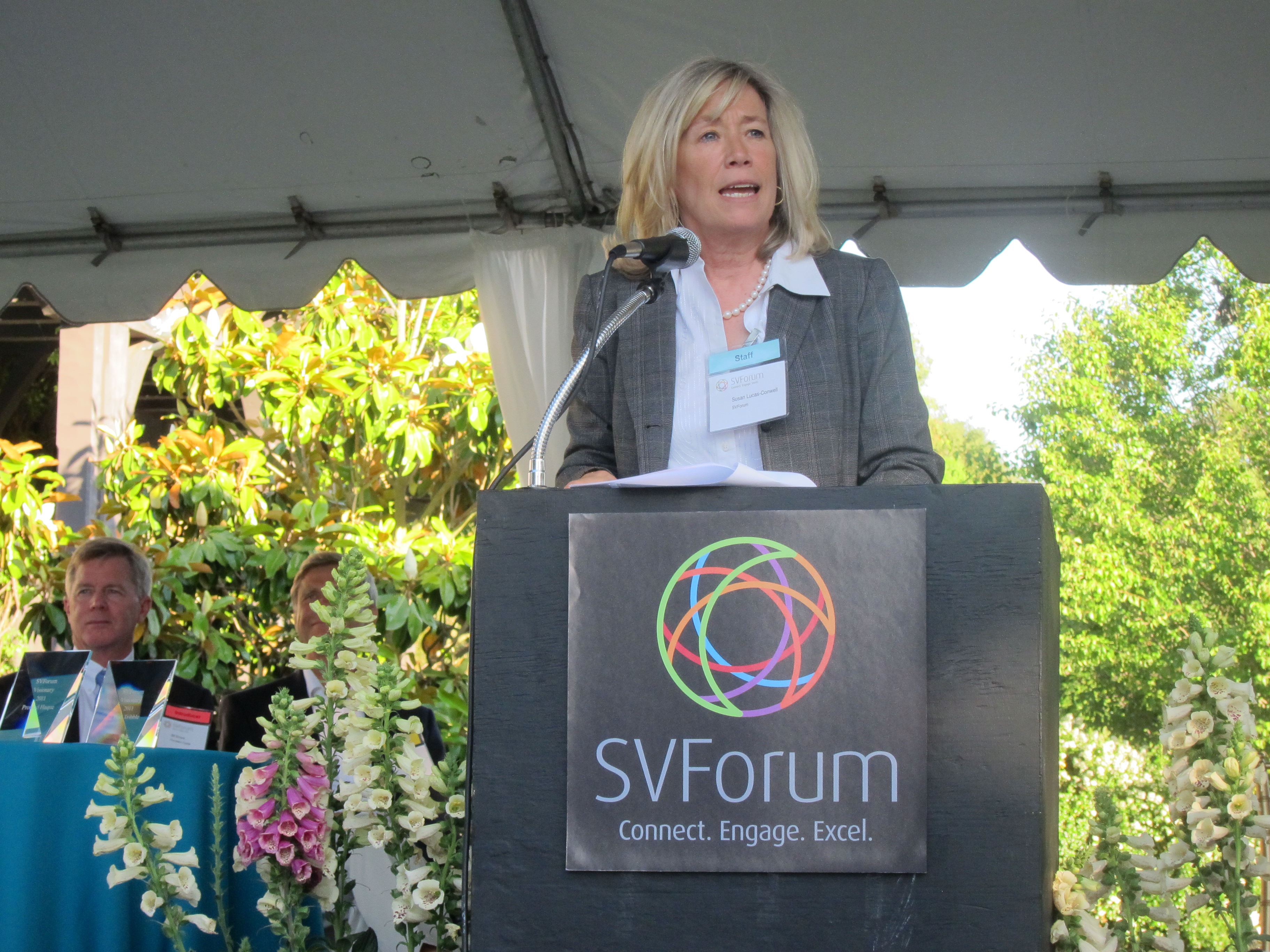
Jun 23, 2011 | Education, Entrepreneurship & Innovation, Silicon Valley Events
By Alison van Diggelen, host of Fresh Dialogues
The 2011 Visionary Awards Ceremony was held at the home of Kelly Porter in Los Altos Hills on June 21, the longest… and also the hottest day of the year. This annual ceremony – the Oscars of Silicon Valley – honored four distinguished technology innovators – Dr. Hermann Hauser (Amadeus Capital Partners), Promod Haque (Norwest Venture Partners), Bud Tribble (Apple Inc.) and TJ Rodgers (Cypress Semiconductor Corporation). Presented by SVForum, previously SDForum, “SV” Silicon Valley – was an important theme of the evening. In accepting their awards, honorees attempted to answer the question: what makes Silicon Valley unique? Or in the case of TJ Rodgers, what makes him unique?
The energetic Susan Lucas-Conwell kicked things off by announcing the new-look SVForum – which has outgrown its SDForum, Software Development status – and is now focused on its Silicon Valley roots. “We continue to grow and evolve,” she said. “We serve a broad footprint covering the entire technology industry.” Interesting to note that cleantech was the first sector she cited, along with the usual suspects: healthcare, IT, software, social media, cloud etc. With a jazzy new logo and a succinct mission to connect, engage and excel; SVForum looks poised for an exciting new chapter.
Promod Haque was introduced by Ken Comee of IBM who promised a “This is your Life” moment. Much to the relief of the audience, it was more of a 21st Century Twitter version (ie short and pithy). Promod began by reflecting on the uniqueness of being a venture capitalist in Silicon Valley – its philosophy and values. There was a collective holding of breath. Were we about to hear the Holy Grail of Silicon Valley?
“The freedom to fail is unique about Silicon Valley,” said Promod. “It’s an essential piece of innovating.” Déjà vu anyone? It’s a popular – even over-used – refrain these days and one that has surfaced previously at the Visionary Awards. Anyone remember Vinod Khosla expound the same philosophy at the 2009 Visionary Awards? Déjà vu or not, Promod’s comments underlined the consensus that it’s a vital part of Silicon Valley’s magic.
Promod then elaborated…“I tell my kids…my entrepreneurs, ‘when you do have failure, it’s not a person, it’s an event in their life. Don’t let it scare you…don’t let it define you.’” Well said. But is the secret sauce of Silicon Valley no longer a big secret?
Next up, Apple’s Bud Tribble, who was introduced by Dan’l Lewin of Microsoft. Dan’l gave us an odd lesson in our A,B,Cs before he got on the crux of the intro: “When Bud speaks, people – like Steve Jobs – listen – and that’s hard!” Dan’l alluded to Apple’s Location-Gate drama, but Bud wisely eschewed the subject, instead enthusing about the special qualities of Silicon Valley. He emphasized the importance of perspectives and how we connect . In Silicon Valley, “the connections go beyond companies – that’s the magic of this place.” As for vision? That all depends on your perspective and he quoted from Alan Kay (the pioneering computer scientist): “Perspective is worth 80 IQ points.” He also took us back to the early days of Apple in the 80’s and described the wide variety of perspectives around the table, including an archeologist and even a Marxist (!) as well as the inevitable computer programmer. Understanding what computers are really good at is key, said Bud. And what is that? Communication. That’s his focus. As for the future, Bud wasn’t giving anything away. True to his solid Apple pedigree, Bud concluded by saying, “I can’t really talk about the future… since I’m at Apple.” A visionary who is keeping his vision tightly under wraps…for the time being.
Later, I asked Bud how Mr. Jobs is doing and if he thinks Jobs is going to come back to the helm on a full time basis. “He finds it hard to stay away,” said Bud. Indeed.
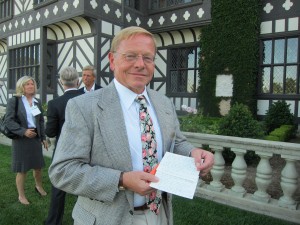 T.J. Rodgers was introduced by Eric Benhamou of Benhamou Ventures and described Rodgers as “a tough boss, argumentative and very competitive,” and added “I’m using polite language here.” The audience was well amused .
T.J. Rodgers was introduced by Eric Benhamou of Benhamou Ventures and described Rodgers as “a tough boss, argumentative and very competitive,” and added “I’m using polite language here.” The audience was well amused .
To be continued…
Meantime, check out many more PHOTOS
Video highlights
For more on Silicon Valley events click here
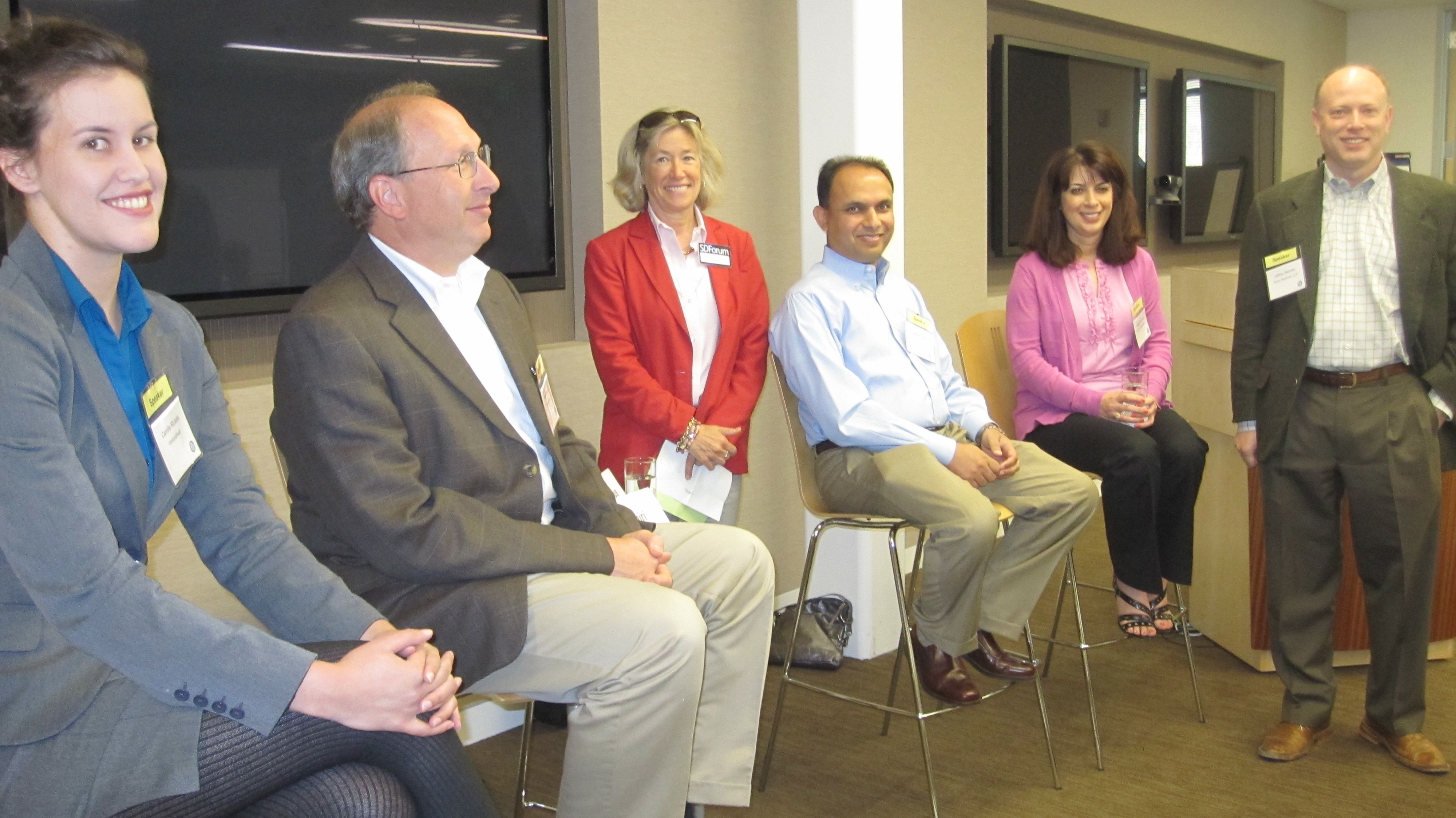
Jun 14, 2011 | Education, Electric Vehicles, Entrepreneurship & Innovation, Storage, Technology, Venture Capital & Finance
By Alison van Diggelen, host of Fresh Dialogues
Today, we’re presenting the third in our new Lesson Plan Series based on Fresh Dialogues interviews. The series is compiled by Lisa Lubliner, our new Fresh Dialogues Education Expert.
Fresh Dialogues Lesson plan – battery technology electric cars
In 2010, Fresh Dialogues produced a video featuring Mark Platshon, a venture capitalist at Vantage Point Capital Partners, one of the leading investors in battery and energy storage innovation. Mark gave a good overview of energy storage, its limits and potential; and explained what venture capitalists are looking for in new storage technologies. Let’s call the VIDEO Batteries 101.
Here are some extracts:
What is a battery?
“Throw a dart at (two elements on) the periodic table and you can make a battery out of it…a potato and a penny can make a battery…unfortunately we have a very limited periodic table…(and remember) Moore’s Law doesn’t apply to chemistry!” VC, Mark Platshon
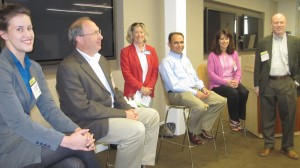
To find out more about batteries and explore a step by step lesson plan about batteries – check out the lesson plan link below:
Why are batteries important to us?
How do batteries work?
How are lithium ion batteries superior to alkaline ones?
How can battery efficiency be improved?
How does battery innovation impact electric cars and the transport sector?
Click this link for the answers: Fresh Dialogues Lesson plan – battery technology electric cars
MORE RESOURCES
At NY Times – Building a Better Car Battery
And NPR – Leading the Charge to make Better Electric Cars
If you’re an educator and have more resources to share on this topic, we’d love to hear from you. Please LET US KNOW –
Lesson plan credit: thanks to GM.com/education
The video was recorded at SDForum’sCleantech Breakfast held at SAP headquarters in Palo Alto on June 29, 2010. The event was moderated by Jeffrey Selman of Nixon Peabody and also featured (former VentureBeat’s and now) Tesla’s Camille Ricketts, Dania Ghantous of Qnovo Corp. and Ashok Lahiri of Enovix.
For more videos and interviews with Green Visionary and NYT columnist, Tom Friedman; Nobel Prize winning economist, Paul Krugman; Oceanographer and Titanic discoverer, Robert Ballard et al…check out Fresh Dialogues archives
For exclusive video interviews, check out the Fresh Dialogues YouTube Channel
For more Lesson Plans check out our Education Tab above (under All Categories)

May 10, 2011 | China - what we can learn, Education
By Alison van Diggelen, host of Fresh Dialogues
Today, we’re presenting the second in our new Lesson Plan Series based on Fresh Dialogues interviews. The series is compiled by Lisa Lubliner, our new Fresh Dialogues Education Expert.
Lesson Plan: How to Predict the Future
In 2010, New York Times columnist, Tom Friedman, made some bold predictions in a Fresh Dialogues interview. He predicted that the demand for Clean Energy (solar, wind, biofuels) was going to explode and that if the US government doesn’t invest sufficiently in Clean Energy research, China is going to dominate the Energy Technology industry.
“What do you suppose our standard of living will be like if we don’t dominate the ET industry?” he said. “If the next great solar company is Chinese? If the next great wind companies are Danish? If the next great battery companies are all Japanese?” Read the transcript here.
News analysts, politicians, historians, and scientists all use current information to predict the future and make decisions for acting. Using historical documents, this lesson encourages students to consider: Why do we make predictions about the future? Do predictions help us? If so, how? On what do we base the predictions that we make?
What did historical figures imagine our lives would look like today? How can we make informed predictions about the future? In this lesson, students consider and discuss predictions about life in 2011 that were written in 1931 by prominent thinkers of the day, and then draw on New York Times articles to develop their own predictions about the future.
This lesson is ideal for Grades 9-12 and is correlated to McREL’s national standards (it can also be aligned to the new Common Core State Standards)
More at New York Times Education Blog
Check out the WONDERFUL files that contain historical documents and other extension activities for teachers to download.
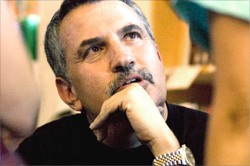 Looking for more Fresh Dialogues based lesson plans?
Looking for more Fresh Dialogues based lesson plans?
Check out Carbon Tax and Carbon Capture – Paul Krugman
And our Education Tab
For more videos, check out our Fresh Dialogues YouTube Channel
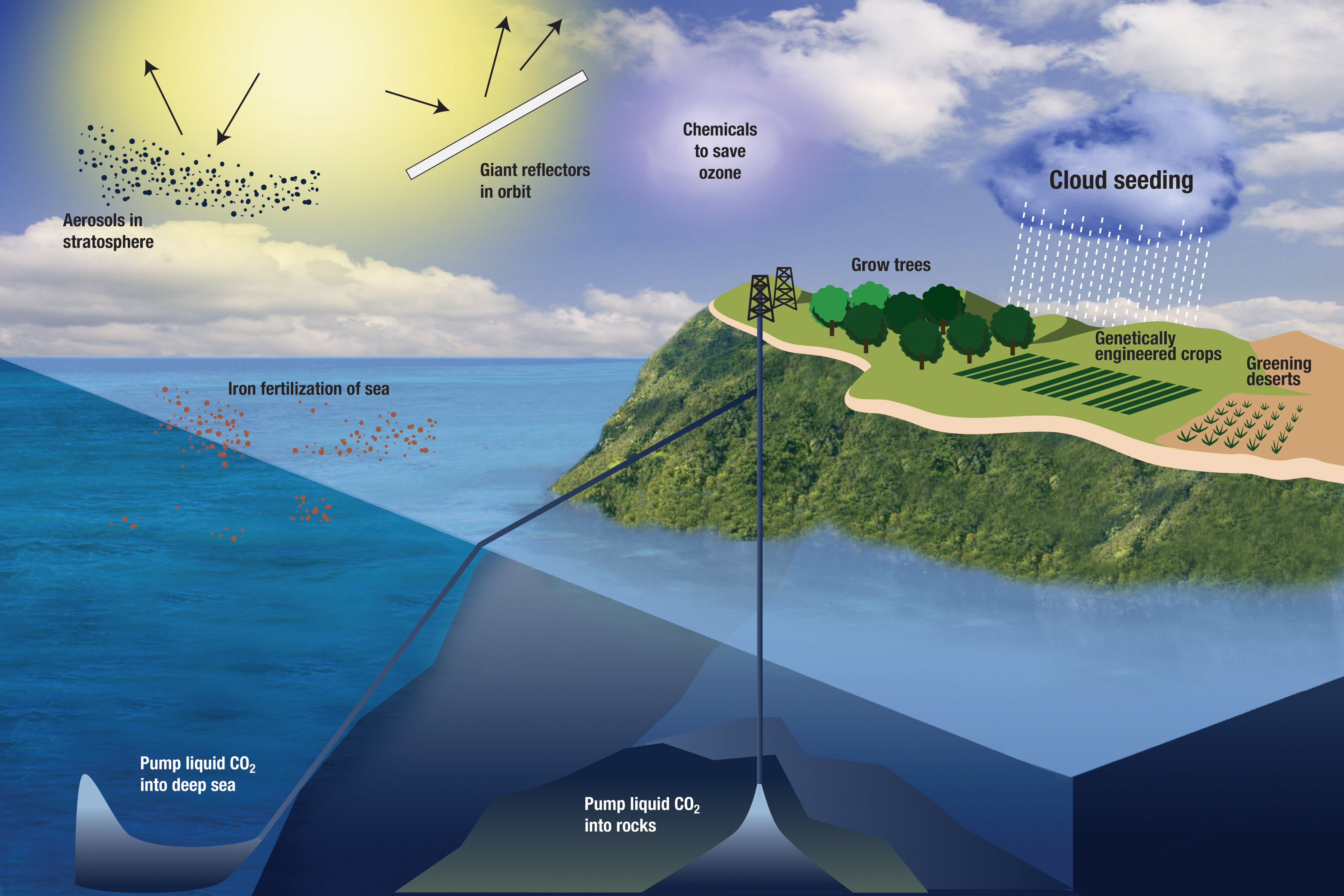
Apr 25, 2011 | Clean Tech, Education, Policy
By Alison van Diggelen, host of Fresh Dialogues
Today, we are launching a new feature on Fresh Dialogues – lesson plans – to help teachers build captivating ways of educating their students about climate change and the green economy. This is possible thanks to Lisa Lubliner, our new Fresh Dialogues Education Expert. She will be matching some compelling Fresh Dialogues videos with topics such as Green Innovation, Batteries and Storage, Saving Energy at Home and School, and Fuel Cells 101. Check back soon at our Educators Page where we will list lesson plans as they are added. Got ideas for background info and resources? Share them here or on our Facebook Page.
Lesson Plan: Stashing CO2 in Rocks
Carbon Capture and Sequestration
Grades 6-8
In this activity, students will learn more about carbon sequestration by creating a carbonated beverage out of apple juice and dry ice. This experiment illustrates how carbon dioxide can be stored in a substance. Students will compare and contrast the results to determine if liquid carbonation is an effective method for carbon sequestration.
Lesson background
One of the leading causes of global climate change is carbon dioxide. Carbon dioxide is a greenhouse gas that traps and stores heat from the sun that would normally escape from Earth’s atmosphere into space. Though some heating is beneficial to life on Earth, too much carbon dioxide in the atmosphere leads to dramatic changes in the Earth’s climate. One important field of research aimed at combating climate change is carbon sequestration. Carbon sequestration is the science of taking carbon dioxide out of the air and storing it away. Scientists have been experimenting with different methods of carbon sequestration through chemical, biological or physical means.
Subject Standards
Subject Matter: Physical Science/Geology
National Standards: NS.5-8.1, NS.5-8.2
Source Links
Ira Flatow Science Friday Blog – Check out the excellent Science Friday video that goes with the topic.
Background information and extension activities
Have students view this short Fresh Dialogues video showing Nobel Prize winning economist, Paul Krugman explain the cap and trade system for carbon and why he thinks climate legislation could work. Here’s the interview transcript
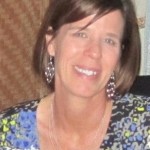
About our Fresh Dialogues Education Expert: Lisa Lubliner is a respected and energetic educator with a varied background in teaching and administration. She has worked as a teacher (Moreland District, California – Teacher of the Year), served as a Gifted and Talented Education consultant, evaluated schools for the State of California and created a successful model for Independent Study Programs in the San Francisco Bay Area. She has an extensive background in alternative education and strives to engage students through real-world projects that emphasize critical thinking and the creation of action plans.
For more videos, check out our Fresh Dialogues YouTube Channel
Check out more lesson plans in the Education Tab
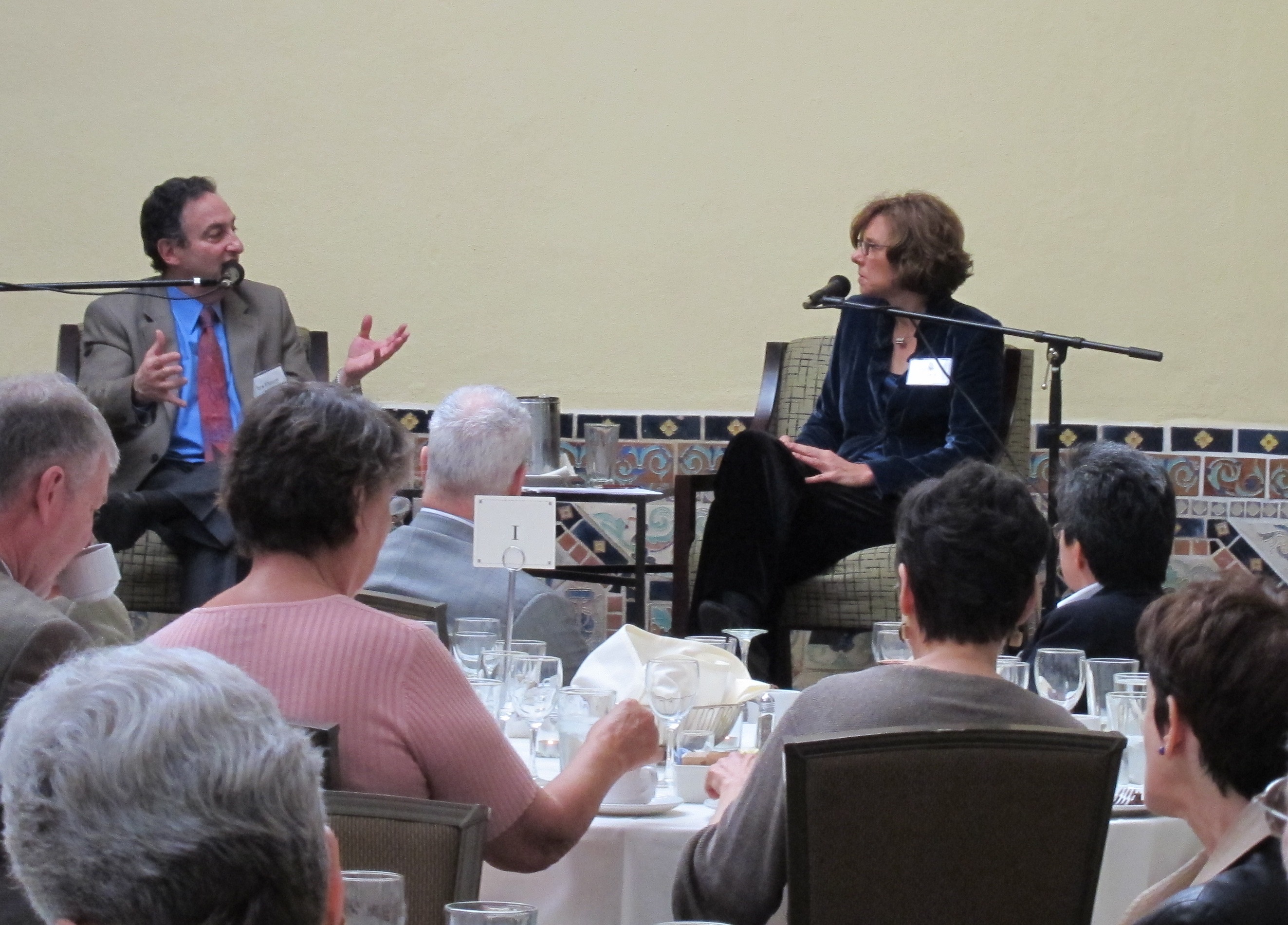
Apr 7, 2011 | Clean Tech, Education, Nuclear Energy, Silicon Valley Events, Solar Energy, Wind Energy
By Alison van Diggelen, host of Fresh Dialogues
Ira Flatow, the exuberant host of NPR’s Science Friday came to Silicon Valley this week. At a reception for KQED at the St. Claire Hotel Atrium in downtown San Jose, Ira took the stage for an animated conversation with Andrea Kissack, Senior Editor of KQED’s QUEST. Here are some of the highlights:
On Japan’s nuclear disaster
“This is an opportunity to build something new – infrastructure for solar thermal (power plants) for example, or wind power…we could be the Saudi Arabia of Wind. Why do you need one solution? We should look at science – see the biodiversity lesson.”
On nuclear power
“Japan was ‘prepared’ but didn’t plan for the Perfect Storm. Nature will find a way to outsmart us.”
On Global Warming
“Over 50% of incoming Republicans don’t ‘believe’ in global warming. The great majority of scientists AGREE on global warming…we don’t talk about ‘the debate’ on Science Friday. Should you bring creationists in to debate evolution? Or have a debate that the world is not flat?”
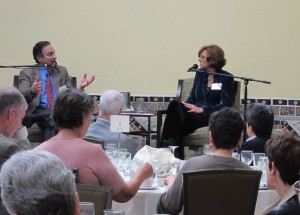 On Clean Energy and California
On Clean Energy and California
“We look to California as a leader in clean energy. We have to get over cheap gas and pay the real value of gas. We expect $2 a gallon while Europe is paying $10.”
How to change the energy status quo?
“If you want change, you have to DEMAND IT. Like in the 60’s. You can’t change people’s minds if they’re entrenched. With Global Warming however, change is happening and the evidence of melting ice is visible.”
On Science Education
“All kids are natural scientists – they need good teachers and mentors to nurture it.”
I was surprised to learn that Science Friday gets only 10% of its budget from NPR. The remainder it has to raise through fundraising. If you enjoy Science Friday and want to learn more about supporting it, check out this link.
For other Fresh Dialogues interviews with an education focus, click here
Here’s an interview with Ocean Scientist, Robert Ballard
And check out our YouTube Channel
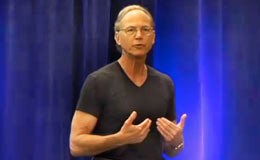
Mar 2, 2011 | Education, Silicon Valley Events, Sustainability
By Alison van Diggelen, host of Fresh Dialogues
In February, I interviewed author and environmentalist, John Robbins at the Commonwealth Club, in Silicon Valley. Robbins is most famous for his books “The Food Revolution” and “Diet for a New America”; has been interviewed by Terry Gross, and Oprah; and is a sought-after speaker on environmentalism, food and animal rights. We had a lively conversation about climate change, conscious consumption, and why he chose to say no to a Baskin Robbins future of ice-cream wealth; and carve his own path, teaching conscious consumption for good health and a healthy planet. Listen to the interview here
(check back soon for video – the interview is scheduled to air on Comcast Channel 30 soon)
On climate change
“The science of climate change to my eyes is incontrovertible. It saddens me that public policy is not coordinated.”
On the link between beef and global warming
“Part of it is the carbon footprint of beef, part of it is the methane. Methane is an extraordinary greenhouse gas, it is twenty times stronger than carbon. It’s produced by cattle, it comes out of both ends of them – as a gas. It’s a biological reality. We are producing so much of it through our beef production and our dairy cows that it’s driving us to a climate chaos and we’re so close to some tipping points where it becomes uncontrollable. We need to do immediate things…”
On Climate Change and Public Policy
“I see the gap between what seems to be politically possible in this country – where so many people no longer even believe that humans are contributing to increased carbon, emissions and destabilization of our climate. But the science (of climate change) to my eyes is literally incontrovertible. It really saddens me and pains me that our public policy is not coordinated with what science is telling us. What will it take to wake us up? How much time do we have? How lucky do we feel? We are gambling…”
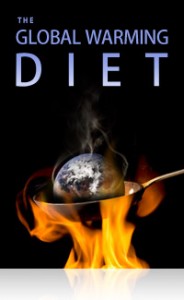 On approaching the planet’s “tipping point
On approaching the planet’s “tipping point
“We are up against nature’s limits. If we can’t learn from that collision that we’re approaching…and adjust ourselves to live within the earth’s means…we are sentencing our children and grandchildren to a future that is probably barely livable.”
On the food solution
“I’d like to see us create a food system that doesn’t contribute to global warming, instead of one that is the leading contributor to it. If we are serious about feeding ourselves, the imperative to move to a plant based diet is a moral and unavoidable solution. Al Gores says change your lightbulbs – what about changing your diet?”
Advice for consumers – Five baby steps
One: Shop at a farmers market
Two: Eat more plants, fresh food, less animals
Three: Eat less
Four: Stop eating processed food, junk food
Five: Laugh more, eat less, Create more, eat less. Love more, eat less. Care more, eat less…

 T.J. Rodgers was introduced by Eric Benhamou of Benhamou Ventures and described Rodgers as “a tough boss, argumentative and very competitive,” and added “I’m using polite language here.” The audience was well amused .
T.J. Rodgers was introduced by Eric Benhamou of Benhamou Ventures and described Rodgers as “a tough boss, argumentative and very competitive,” and added “I’m using polite language here.” The audience was well amused .












